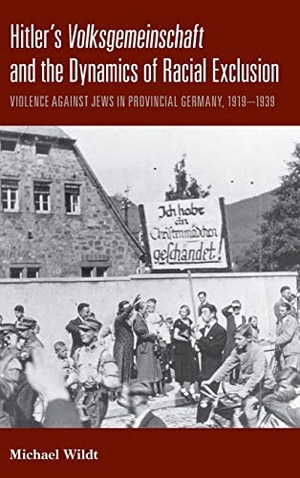Für statistische Zwecke und um bestmögliche Funktionalität zu bieten, speichert diese Website Cookies auf Ihrem Gerät. Das Speichern von Cookies kann in den Browser-Einstellungen deaktiviert werden. Wenn Sie die Website weiter nutzen, stimmen Sie der Verwendung von Cookies zu.
Cookie akzeptieren
Michael Wildt
Hitler's Volksgemeinschaft and the Dynamics of Racial Exclusion
- Berghahn Books
- 2012
- Gebunden
- 322 Seiten
- ISBN 9780857453228
Michael Wildt is one of the most innovative historians of contemporary history working in Germany today... His scholarship is marked by imaginative questions and answers that are arrestingly original, patiently reconstructed, close to the sources, and justly influential...Like much of his previous work, ...[his book] impresses not just for reinterpreting a topic...but for recalibrating our lens onto the Third Reich. · Yad Vashem Studies Michael Wildt's account will stimulate academic as well as public debate about the causes and underlying effects of the Nazis' persecution of the Jews and shed new light on the Nazi regime's criminal actions against those excluded from the Volksgemeinschaft before 1939. It contradicts the recent tendency to [portray] the Germans as the victims of the Nazi system and reactivates public consciousness of occurrences that have all too often been pushed aside. · Hans Mommsen in Frankfurter Rundschau Wildt has become in recent years one of the most renowned scholars on Nazi Germany, or, indeed, of contemporary history, thanks in particular to his generational collective biography of a decisive group of perpetrators of the Holocaust, the leadership corps of the Reichssicherheitshauptamt. [....] The value of this book lies in the wide-ranging intellectual links in which the author embeds his empirical material: from the sanctions of honor in the Middle Ages to Carl Schmitt, from an anthropology of violence to the European context of anti-Jewish pogroms. · Paul Nolte in die tageszeitung Based on a close reading of newly discovered, disturbing archival sources, Michael Wildt, one of the most prolific historians of the Third Reich, shows that anti-Jewish violence was already omnipresent in Nazi Germany before 1939. Hitler's Volksgemeinschaft and the Dynamics of Racial Exclusion demonstrates that the Nazi Volksgemeinschaft was not just a product of Goebbels' propaganda machinery but brutal reality - a national community based on daily terror. Wildt's book is a must-read for every historian of twentieth-century
Mehr
Weniger
zzgl. Versand
Etwa 20 Tage